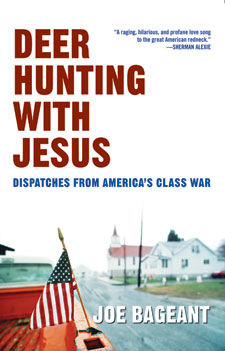This book's blurb describes it as hilarious and funny. It isn't. It is very serious and at times very sad. Your.sydneyanglicans.net had this in its secular section for reviewers. It's not exactly secular either.
It is a story " not exactly a description or a history " of the American rural poor.
 Joe Bageant writes particularly about his own hometown of Winchester, Virginia, which by American standards is a small town of 23,500. However, his message is general. And it's a message of gloom and sadness. It's a story about a society where 20 per cent don't finish high school, where almost none go on to university, and where most employees do not earn enough to pay for health insurance or buy a house.
Joe Bageant writes particularly about his own hometown of Winchester, Virginia, which by American standards is a small town of 23,500. However, his message is general. And it's a message of gloom and sadness. It's a story about a society where 20 per cent don't finish high school, where almost none go on to university, and where most employees do not earn enough to pay for health insurance or buy a house.
Bageant lets people he grew up with tell their own stories So we read of Dottie, who at 59 is half blind (she walks with a cane), overweight, has high blood pressure and has a husband who earns $8 an hour for cleaning cars. After paying rent and other fixed costs they have $35 a week to pay for groceries and medicine. They survive by not filling some of Dottie's scripts. So she just gets sicker.
Bageant and his son's story tells the decline of American manufacturing. When he left the US Navy in 1969 he worked at Rubbermaid, then Winchester's biggest employer. He got $1.65 an hour, free (or almost free) health cover for himself and his family and he made a decent income. Now his son works there and earns about $15 an hour and can barely afford health insurance ($250 per month per person with a deductible of $1200 and it only covers 80 per cent of the bills in any case).
Bageant writes of meeting Joe Cave who has had two discs in his back give up for which he received workers compensation and needs a hip replacement which the compensation insurer says is not work related. Of course, the injury is, and so Cave is bringing an action to prove it but in the meantime he lives on a $480 a month disability pension and pays $320 on his share of the rent for the house in which he and others live.
He tells many other stories about working people, about housing, about health care, about education. And he surprises us. Like most Australians I am smug about our gun control laws and look at America as being the shooters capital. But not so according to Bageant. Many people still hunt for food in America " it's sometimes the only way some small town folk put meat on the table.
Guns for many Americans are everyday tools. And he shows us how anti-gun hysteria affects people by telling the story of Joshua Phelps, of Pine Bush, New York (population 1539), a high school student and a member of the school's civil war club, who after appearing in a school re-enactment of the Battle of Chancellorville threw his blank firing replica musket and Union uniform into his car. Joshua was arrested, dragged from class and suspended from school. Gun ownership, Bageant says, is the biggest political divide between American liberals and the small-town people he writes about.
But the biggest divide of all is Christianity, or at least the version most Americans in small towns know. And here more then anywhere else Bageant stops being secular and starts sounding like Amos.
Bageant comes from a Christian family. His father's last words to him were "Will you be saved? Will you be on Canaan's shore?". His brother is a minister in an independent Baptist church. But Bageant himself is not Christian. And it's not hard to see why.
The church he writes about is the Creation Science church, the church that supports Bush because he is "pro-life " (ignoring the fact " reported a year or so ago in Southern Cross " that while Clinton was President US abortion rates fell and under Bush they have risen to become the highest in the world) and more than that, the church " or at least a large part of it " wants to return to the Old Testament penal code " complete with stonings. This is an heretical church, a church preaching Law not Grace, a church rather like that in Galacia to which Paul wrote "what makes a man righteous is not obedience to the Law but faith in Jesus Christ".
Deer hunting with Jesus challenges us directly. It contains a preface addressed to the Australian reader that asks us to avoid the low wage service economy that now afflicts the USA and to foster education. But it should also encourage us to preach the true gospel and in so doing stand with the poor and needy and deliver the oppressed.
America, Bageant writes, despite its outward Christianity has failed to do this. It is a call from a man who I think has lost his faith because the gospel was not properly preached to him. Every minister who is in a parish west of Homebush, south of Port Hacking or north of the Hawkesbury should read this book.



















